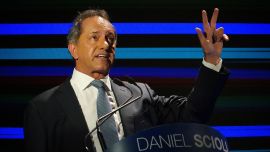Last December Noticias anticipated that AFI (Agencia Federal de Inteligencia) trustee Cristina Caamaño was not planning on hanging onto the job. On the one hand, because she was already fed up: her confirmation was shelved in the Senate because Vice-President Cristina Fernández de Kirchner did not deign to bring it to the house floor. And on the other hand, because President Alberto Fernández had already promised the slot to Agustín 'El Chivo’ Rossi, in order to have somebody who could clear the CFK filter. What happened? And why the delay in the change?
Departure
Caamaño had a lucky break last December when she went to court with the accidental discovery by an intelligence agent of a meeting at the offices of Banco Provincia, the Buenos Aires provincial bank. The case, which came to be known as ‘Gestapo PRO’ or ‘Gesta-PRO,’ and its magical discovery gave an extra six months of life to the ex-prosecutor and president of Justicia Legítima.
Nevertheless, she gave advance notice in her end-of-year toast that her days heading AFI were numbered. With a glass of champagne in her hand she said: “A trusteeship cannot be eternal.” To what was she referring? To her trusteeship, or its mission of “reordering” the organisation emerging from the highly questioned stewardship of Gustavo Arribas and Silvia Majdalani? It would seem that by the end of last year Caamaño felt that this task had been performed and that there was no need to continue.
But political logic is not always linear. Caamaño was not as 100 percent aligned with Cristina as one might suppose. They may have overlapped on judicial issues but Caamaño was given the job by Alberto with (then-Cabinet chief) Santiago Cafiero as her point of reference. On a day-to-day basis, the now former trustee clashed fiercely with officials responding to Máximo Kirchner.
Caamaño is currently weighing whether or not to accept the presidential offer to replace Entre Ríos Province ex-governor Sergio Urribarri (recently convicted for corruption) at the Argentine Embassy in Israel. If she accepts, the unknown factor would be whether this time Cristina would consider placing this nomination for confirmation on the Senate floor.
Arrival
Rossi arrives at the Agencia Federal de Inteligencia with this backdrop. But he has one advantage in his favour – he will not be its trustee but the agency’s official director (or 'Señor 5', in spy jargon). He will be named in commission until confirmed by the Senate.
What is Cristina going to do with Rossi’s nomination? If she whips it through quickly, it will become evident that there were problems with Caamaño and if there is delay, this will blow up the conflict with the Santa Fe politico, who already feels mistreated from last year’s midterms when Fernández de Kirchner picked Marcelo Lewandowski as the ruling coalition’s senatorial candidate over him.
Rossi has had a zigzagging relationship with Alberto and Cristina. Last year the support for Lewandowski took him by surprise when he had launched his candidacy. Then he was again snubbed, this time by the president, who said on television that all officials who were candidates would have to vacate their posts for the campaign. Rossi found out while appearing on another television programme and had to resign.
This official’s return comes with some setbacks and challenges. In principle he only has a year and a bit and getting on top of this area will take time, even if his stint at the Defence Ministry included the intelligence services of the Army, Navy and Air Force.
Among the challenges he will face will be administering an organisation famed for being partitioned between different political groupings.
Upon the return of democracy, the agency – then known as the Secretaría de Inteligencia del Estado (SIDE) – had remnants of military infiltrators mingling with the Radicals reaching office. When former president Carlos Menem came to power, these were joined by Peronists who co-existed with the remaining Radicals. Fernando de la Rúa added a further layer of Radicals while Kirchnerism consolidated a mass of agents co-ordinated by its then-factotum Antonio ‘Jaime’ Stiuso. In 2015 (the last year of Cristina Fernández de Kirchner’s presidency), Oscar Parrilli purged the AFI of its historic agents, replacing them with his own militants. When Mauricio Macri reached the presidency, there was a new reshuffle while the return of Kirchnerism to power added yet another political layer to the agency. Today there is a mix between historic agents and officials responding to Parrilli, others to Interior Minister Eduardo ‘Wado’ De Pedro, to deputy Rodolfo Tailhade (who briefly ran AFI in 2015) and also those who came with Caamaño, to whom Rossi’s agents will now be added.
Administering an organisation responding to so many bosses is an art which is only experienced in politics.
One unknown factor stemming from Rossi’s arrival is whether military officers enjoying his confidence who worked under his orders at the Defence Ministry will now be joining. The military dropped out of AFI in 1983 so that their return would be a novelty because they have different training, as do the police. Under Macri, the AFI was overrun by retired police officers, which would partly explain the failure of Arribas and Majdalani. The training of an intelligence agent is different from police and even more so from military training.
The other challenge facing Rossi will be collaboration in drug-trafficking investigations since today Argentina has almost none with agencies abroad. When drugs reach Europe, they prefer to confiscate them there ahead of notifying the authorities here in advance.
Regaining confidence will take hard work – perhaps the 18 months ahead of him will not be enough.





















Comments